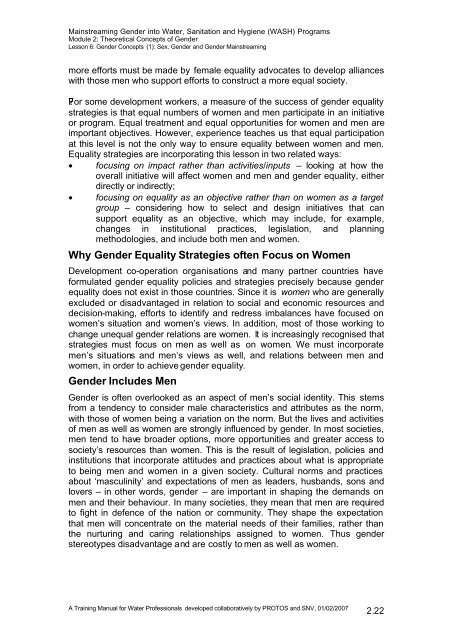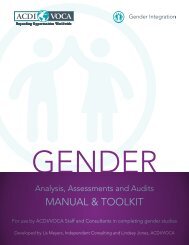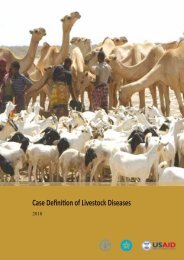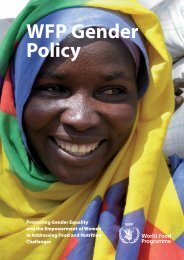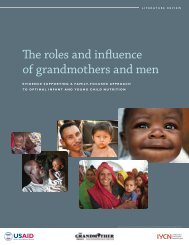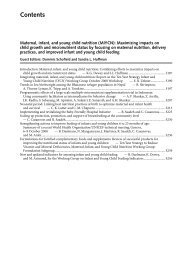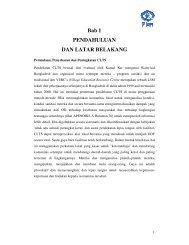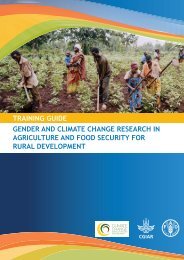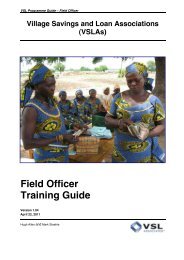Module 2. Theorethical Concepts of Gender - FSN Network Portal
Module 2. Theorethical Concepts of Gender - FSN Network Portal
Module 2. Theorethical Concepts of Gender - FSN Network Portal
You also want an ePaper? Increase the reach of your titles
YUMPU automatically turns print PDFs into web optimized ePapers that Google loves.
Mainstreaming <strong>Gender</strong> into Water, Sanitation and Hygiene (WASH) Programs<br />
<strong>Module</strong> 2: Theoretical <strong>Concepts</strong> <strong>of</strong> <strong>Gender</strong><br />
Lesson 6: <strong>Gender</strong> <strong>Concepts</strong> (1): Sex, <strong>Gender</strong> and <strong>Gender</strong> Mainstreaming<br />
more efforts must be made by female equality advocates to develop alliances<br />
with those men who support efforts to construct a more equal society.<br />
?For some development workers, a measure <strong>of</strong> the success <strong>of</strong> gender equality<br />
strategies is that equal numbers <strong>of</strong> women and men participate in an initiative<br />
or program. Equal treatment and equal opportunities for women and men are<br />
important objectives. However, experience teaches us that equal participation<br />
at this level is not the only way to ensure equality between women and men.<br />
Equality strategies are incorporating this lesson in two related ways:<br />
• focusing on impact rather than activities/inputs – looking at how the<br />
overall initiative will affect women and men and gender equality, either<br />
directly or indirectly;<br />
• focusing on equality as an objective rather than on women as a target<br />
group – considering how to select and design initiatives that can<br />
support equality as an objective, which may include, for example,<br />
changes in institutional practices, legislation, and planning<br />
methodologies, and include both men and women.<br />
Why <strong>Gender</strong> Equality Strategies <strong>of</strong>ten Focus on Women<br />
Development co-operation organisations and many partner countries have<br />
formulated gender equality policies and strategies precisely because gender<br />
equality does not exist in those countries. Since it is women who are generally<br />
excluded or disadvantaged in relation to social and economic resources and<br />
decision-making, efforts to identify and redress imbalances have focused on<br />
women’s situation and women’s views. In addition, most <strong>of</strong> those working to<br />
change unequal gender relations are women. It is increasingly recognised that<br />
strategies must focus on men as well as on women. We must incorporate<br />
men’s situations and men’s views as well, and relations between men and<br />
women, in order to achieve gender equality.<br />
<strong>Gender</strong> Includes Men<br />
<strong>Gender</strong> is <strong>of</strong>ten overlooked as an aspect <strong>of</strong> men’s social identity. This stems<br />
from a tendency to consider male characteristics and attributes as the norm,<br />
with those <strong>of</strong> women being a variation on the norm. But the lives and activities<br />
<strong>of</strong> men as well as women are strongly influenced by gender. In most societies,<br />
men tend to have broader options, more opportunities and greater access to<br />
society’s resources than women. This is the result <strong>of</strong> legislation, policies and<br />
institutions that incorporate attitudes and practices about what is appropriate<br />
to being men and women in a given society. Cultural norms and practices<br />
about ‘masculinity’ and expectations <strong>of</strong> men as leaders, husbands, sons and<br />
lovers – in other words, gender – are important in shaping the demands on<br />
men and their behaviour. In many societies, they mean that men are required<br />
to fight in defence <strong>of</strong> the nation or community. They shape the expectation<br />
that men will concentrate on the material needs <strong>of</strong> their families, rather than<br />
the nurturing and caring relationships assigned to women. Thus gender<br />
stereotypes disadvantage and are costly to men as well as women.<br />
A Training Manual for Water Pr<strong>of</strong>essionals developed collaboratively by PROTOS and SNV, 01/02/2007<br />
<strong>2.</strong>22


